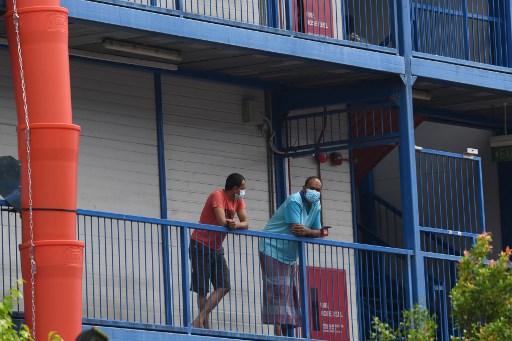Singapore—Prime Minister Lee Hsien Loong announced on Monday (Dec 14) that the country will be entering Phase 3 of reopening by Dec 28, which means that more restrictions will be relaxed in time for the holiday season, although Singaporeans are still urged to keep their guard up.
However, one segment of society will not be enjoying the same easing of restrictions quite yet. Singapore’s migrant workers will remain, for the most part, confined to their dormitories, at least for now.
Ninety-three per cent of the country’s cases were found among migrant workers, and a Dec 14 update from the Ministry of Health (MOH) said that the prevalence rate of the infection among the 323,000 who live in dormitories is at 47 per cent, which means nearly half of the workers have antibodies against the infection already.
Moreover, there have been hardly any new cases among migrant workers, as the new infections in Singapore have mostly been imported ones.
Due to the high rate of infections among the workers, the lockdown saw strict restrictions placed upon the dormitories, with workers not permitted to leave their dorms, and at times even their rooms, save for work and necessary errands, which has caused migrant workers advocates to express concern.
The vice president of Transient Workers Count Too, Alex Au, is quoted in a recent New York Times (NYT) article as saying, “Basically they are treated as prisoners to be transported out for work and then transported back.”
Advocates sounded the alarm concerning the mental health of the workers during the long lockdown period, especially after it was reported that some had resorted to self-harm.
The NYT article included a quote from a Bangladeshi worker only identified as ‘Firoz’, who said, “Now it’s normal, but we cannot go out,” adding that it’s “important to give the workers freedom.”
‘Firoz’ also said that some workers “were struggling to keep their spirits up” as they could not leave the dorms to meet up with friends or go and buy the food they prefer, even if the number of new cases of Covid-19 for workers in dormitories is practically nil.
The workers have been allowed since late in October to apply to go out for three-hour-long visits to certain recreation centers to socialize, shop, and send money home.
And when the country enters Phase 3, the MOH said that it “will start a pilot scheme in the first quarter of 2021 to allow migrant workers in some dormitories to access the community once a month, subject to compliance with RRT (Rostered Routine Testing), wearing of contact-tracing devices and safe living measures.”
But Mr Au pointed out to the NYT that since almost half of the migrant workers are already showing immunity to the virus based on MOH’s report, they could be said to be safer than the rest of the population, and added that higher restrictions on their movement make no sense.
He asked, “The new infection rate is no different from the general population, so why are they still being confined at a terrible cost to their mental health?” —/TISG
Read also: Migrant workers to get better mental health care support

